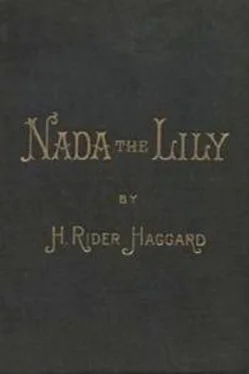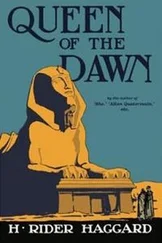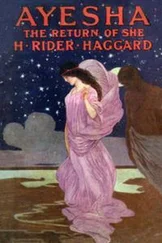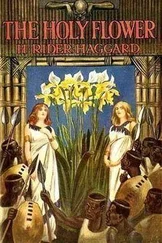"Keep your kisses for our lord, girl," Zinita said roughly. "As my beads are scattered so shall you scatter this People of the Axe."
Now Nada turned away with a little sigh, and the people murmured, for they thought that Zinita had treated her badly. Then she stretched out her hand again, and gave the lily in it to Umslopogaas, saying:—
"Here is a token of our betrothal, Lord, for never a head of cattle have my father and I to send—we who are outcasts; and, indeed, the bridegroom must pay the cattle. May I bring you peace and love, my Lord!"
Umslopogaas took the flower, and looked somewhat foolish with it—he who was wont to carry the axe, and not a flower; and so that talk was ended.
Now as it chanced, this was that day of the year when, according to ancient custom, the Holder of the Axe must challenge all and sundry to come up against him to fight in single combat for Groan–Maker and the chieftainship of the people. Therefore, when the talk was done, Umslopogaas rose and went through the challenge, not thinking that any would answer him, since for some years none had dared to stand before his might. Yet three men stepped forward, and of these two were captains, and men whom the Slaughterer loved. With all the people, he looked at them astonished.
"How is this?" he said in a low voice to that captain who was nearest and who would do battle with him.
For answer the man pointed to the Lily, who stood by. Then Umslopogaas understood that because of the medicine of Nada's beauty all men desired to win her, and, since he who could win the axe would take her also, he must look to fight with many. Well, fight he must or be shamed.
Of the fray there is little to tell. Umslopogaas killed first one man and then the other, and swiftly, for, growing fearful, the third did not come up against him.
"Ah!" said Galazi, who watched, "what did I tell you, Mopo? The curse begins to work. Death walks ever with that daughter of yours, old man."
"I fear so," I answered, "and yet the maiden is fair and good and sweet."
"That will not mend matters," said Galazi.
Now on that day Umslopogaas took Nada the Lily to wife, and for awhile there was peace and quiet. But this evil thing came upon Umslopogaas, that, from the day when he wedded Nada, he hated even to look upon Zinita, and not at her alone, but on all his other wives also. Galazi said it was because Nada had bewitched him, but I know well that the only witcheries she used were the medicine of her eyes, her beauty, and her love. Still, it came to pass that henceforward, and until she had long been dead, the Slaughterer loved her, and her alone, and that is a strange sickness to come upon a man.
As may be guessed, my father, Zinita and the other women took this ill. They waited awhile, indeed, thinking that it would wear away, then they began to murmur, both to their husband and in the ears of other people, till at length there were two parties in the town, the party of Zinita and the party of Nada.
The party of Zinita was made up of women and of certain men who loved and feared their wives, but that of Nada was the greatest, and it was all of men, with Umslopogaas at the head of them, and from this division came much bitterness abroad, and quarrelling in the huts. Yet neither the Lily nor Umslopogaas heeded it greatly, nor indeed, anything, so lost and well content were they in each other's love.
Now on a certain morning, after they had been married three full moons, Nada came from her husband's hut when the sun was already high, and went down through the rock gully to the river to bathe. On the right of the path to the river lay the mealie–fields of the chief, and in them laboured Zinita and the other women of Umslopogaas, weeding the mealie–plants. They looked up and saw Nada pass, then worked on sullenly. After awhile they saw her come again fresh from the bath, very fair to see, and having flowers twined among her hair, and as she walked she sang a song of love. Now Zinita cast down her hoe.
"Is this to be borne, my sisters?" she said.
"No," answered another, "it is not to be borne. What shall we do—shall we fall upon her and kill her now?"
"It would be more just to kill Bulalio, our lord," answered Zinita. "Nada is but a woman, and, after the fashion of us women, takes all that she can gather. But he is a man and a chief, and should know wisdom and justice."
"She has bewitched him with her beauty. Let us kill her," said the other women.
"Nay," answered Zinita, "I will speak with her," and she went and stood in the path along which the Lily walked singing, her arms folded across her breast.
Now Nada saw her and, ceasing her song, stretched out her hand to welcome her, saying, "Greeting, sister." But Zinita did not take it. "It is not fitting, sister," she said, "that my hand, stained with toil, should defile yours, fresh with the scent of flowers. But I am charged with a message, on my own behalf and the behalf of the other wives of our Lord Bulalio; the weeds grow thick in yonder corn, and we women are few; now that your love days are over, will not you come and help us? If you brought no hoe from your Swazi home, surely we will buy you one."
Now Nada saw what was meant, and the blood poured to her head. Yet she answered calmly:—
"I would willingly do this, my sister, though I have never laboured in the fields, for wherever I have dwelt the men have kept me back from all work, save such as the weaving of flowers or the stringing of beads. But there is this against it—Umslopogaas, my husband, charged me that I should not toil with my hands, and I may not disobey my husband."
"Our husband charged you so, Nada? Nay, then it is strange. See, now, I am his head wife, his Inkosikaas—it was I who taught him how to win the axe. Yet he has laid no command on me that I should not labour in the fields after the fashion of women, I who have borne him children; nor, indeed, has he laid such a command upon any of our sisters, his other wives. Can it then be that Bulalio loves you better than us, Nada?"
Now the Lily was in a trap, and she knew it. So she grew bold.
"One must be most loved, Zinita," she said, "as one must be most fair. You have had your hour, leave me mine; perhaps it will be short. Moreover this: Umslopogaas and I loved each other much long years before you or any of his wives saw him, and we love each other to the end. There is no more to say."
"Nay, Nada, there is still something to say; there is this to say: Choose one of two things. Go and leave us to be happy with our lord, or stay and bring death on all."
Now Nada thought awhile, and answered: "Did I believe that my love would bring death on him I love, it might well chance that I would go and leave him, though to do so would be to die. But, Zinita, I do not believe it. Death chiefly loves the weak, and if he falls it will be on the Flower, not on the Slayer of Men," and she slipped past Zinita and went on, singing no more.
Zinita watched her till she was over the ridge, and her face grew evil as she watched. Then she returned to the women.
"The Lily flouts us all, my sisters," she said. "Now listen: my counsel is that we declare a feast of women to be held at the new moon in a secret place far away. All the women and the children shall come to it except Nada, who will not leave her lover, and if there be any man whom a woman loves, perhaps, my sisters, that man would do well to go on a journey about the time of the new moon, for evil things may happen at the town of the People of the Axe while we are away celebrating our feast."
"What, then, shall befall, my sister?" asked one.
"Nay, how can I tell?" she answered. "I only know that we are minded to be rid of Nada, and thus to be avenged on a man who has scorned our love—ay, and on those men who follow after the beauty of Nada. Is it not so, my sisters?"
Читать дальше












